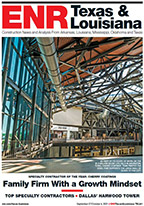This includes energy management as well as service and facilities management, and expansion into other market sectors that include higher education, federal work and data centers, explains Bob Richards, president of TDI's Central Texas office. The firm also continues to do commercial office projects and renovations, and it designs and installs its own building automation systems.
TDI also includes operation and maintenance in the mix, which account for 30% of its construction-related business revenue.
"So that's doing operations, maintenance, building improvements, but not what most people would consider construction," says MacDowell. "That's really helped us the last couple of years."
The company's largest job this year was its $86-million contract on the University of Texas Southwestern Medical Center, a 12-story, 424-bed hospital being built on 30 acres in Dallas' hospital district that is scheduled for completion in December 2014. TDI, the project's mechanical contractor, is using more than 250 mechanics to complete the project, which includes HVAC systems, plumbing systems, med-gas systems, kitchen exhaust and equipment connections, automation and controls, and all duct and pipe insulation.
"We've been prefabricating mechanical systems for over 20 years, but the new twist to that is we're seeing a lot more multitrade prefab," MacDowell points out. "So in complex hospitals, we're seeing a lot more opportunities for us to prefabricate a hospital headwall or a patient room headwall and then also have the electricians come over and put all the conduit and all the electrical in that same wall assembly and then deliver that to the project."
TDI completed work on the University of Houston's Health and Biomedical Sciences Center, a $68-million, six-story research and patient eye-care facility of more than 172,000 sq ft.
Having broad offerings has enabled TDI to keep revenue steady amid shaky market conditions.
"You know, if you're just doing hospitals, and they stop building hospitals, you're in trouble. But when you're doing a little bit of all of it, you just sort of shift your focus," Moore explains. "We've definitely slowed a little from the boom a few years ago, but nothing like the industry has."
The company is also determined to keep its employees working, since many also are stockholders. About 1,350 of TDI's 1,700 employees own shares through an employee stock ownership plan. Top executives hold only about 20% of outstanding shares.
"So it makes for a really unique environment to work in—where everybody cares and everybody is focused on creating success," MacDowell says. "I think that's helped us a lot. That's also one of the reasons we got so aggressive in maintaining our backlog."









